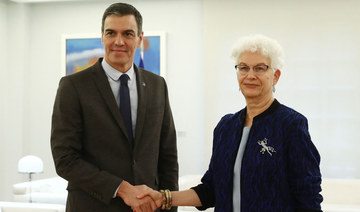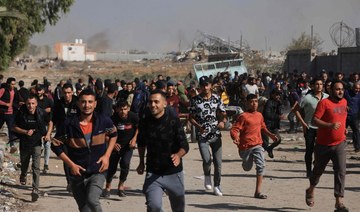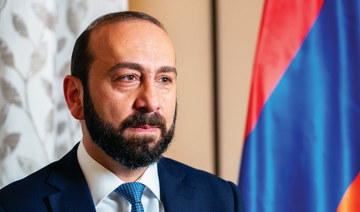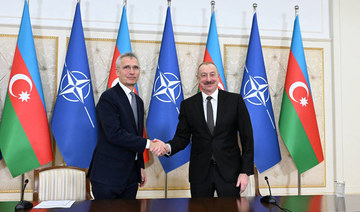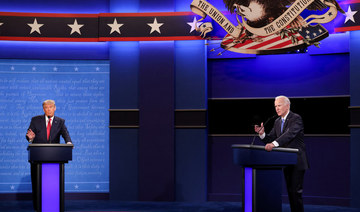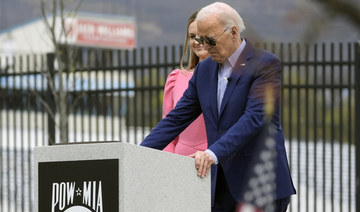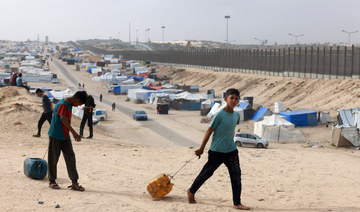NEW DELHI: Delhi shut all primary schools on Wednesday as pollution hit 70 times the World Health Organization’s safe level, prompting doctors in the Indian capital to warn of a public health emergency.
Dense grey smog shrouded the roads of the world’s most polluted capital, where many pedestrians and bikers wore masks or covered their mouths with handkerchiefs and scarves.
The US embassy website showed the concentration of PM 2.5 — the microscopic particles that are the most damaging to health — topped 700 early on Wednesday morning, 70 times the WHO guidelines on long-term exposure, before dropping slightly.
“When I came to Delhi in 1984, the air in the city was clean. But today when I left at 4 am for work I could barely see anything,” said Jeevanand Joshi, a roadside tea seller.
“This is not fog, this is smoke, and it is certainly making us sick.”
The Indian Medical Association declared a public health emergency, urging administrators to “curb this menace,” while the Environment Pollution Authority warned that things were set to get worse in the coming days.
As public outrage mounted, the Delhi government ordered the closure of all primary schools on Wednesday.
“We have decided to shut schools up to primary level for a day, and will evaluate the situation on an hourly basis to see if such a closure needs to be extended,” Delhi’s deputy chief minister Manish Sisodia told reporters.
Almost 2 million students are enrolled in primary schools in Delhi, according to government data from 2015.
All outdoor activities have also been banned across the capital’s 6,000 schools while pollution levels remain at severe levels.
The city of 20 million has the unenviable distinction of being the world’s most polluted major city, often surpassing Beijing.
Since 2014, when WHO figures showed the extent of the crisis, authorities in Delhi have closed power plants temporarily and experimented with taking some cars off the road.
But the temporary measures have so far had little effect.
Delhi’s air quality typically worsens ahead of the onset of winter as cooler air traps pollutants near the ground, preventing them from dispersing into the atmosphere, a phenomenon known as inversion.
High levels of moisture in the air and a lack of wind meant emissions had become trapped in the environment, according to India’s Central Pollution Control Board.
Firecrackers set off to celebrate the Diwali festival of lights in the city add to the toxic mix created by pollution from diesel engines, coal-fired power plants and industrial emissions.
The problem is further exacerbated by the burning of crop stubble by farmers after the harvest in northern India, a practice that remains commonplace despite an official ban.
On Tuesday India’s Environment Pollution Authority, which was set up by the Supreme Court to tackle the issue, ordered the closure of dust-spewing brick kilns and an increase in parking fees to encourage the use of public transport.
“In terms of air pollution, things are expected to get much worse in the coming days,” Bhure Lal, head of the agency, said in a statement late Tuesday.
Schools shut as toxic smog hits Delhi
Schools shut as toxic smog hits Delhi
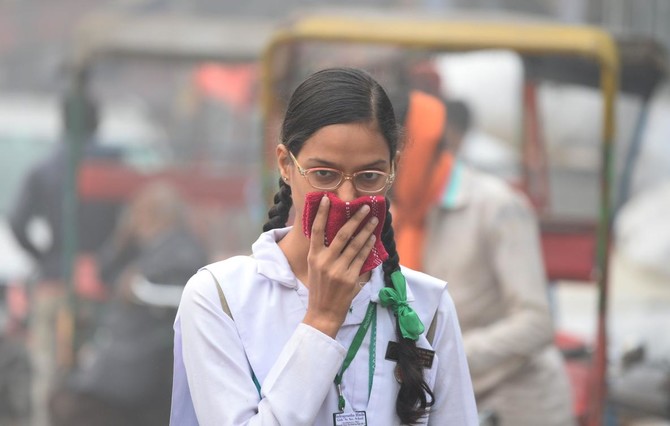
Pedro Sanchez, a risk-taker with a flair for survival
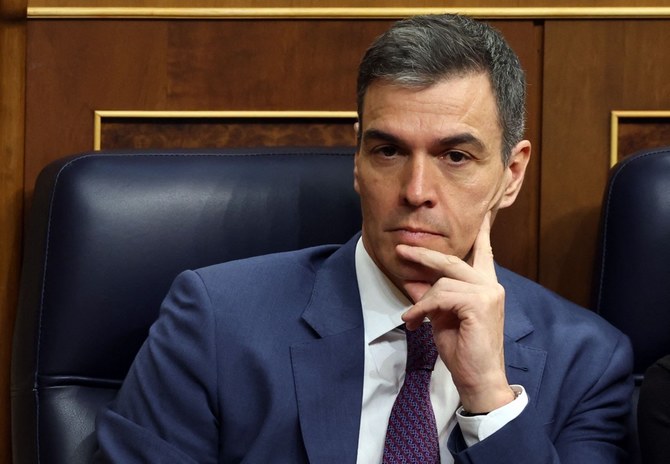
- Sanchez said on Wednesday that he was considering stepping down
MADRID: Spanish Prime Minister Pedro Sanchez, who will on Monday announce whether he remains in his post, is an expert in political survival who has built a career on taking political gambles.
“I have learned to push myself until the referee blows the final whistle,” the head of Spain’s Socialist party and a former basketball player wrote in his 2019 autobiography, “Resistance Manual.”
On Wednesday, he said that he was considering stepping down after a Madrid court announced an investigation into his wife Begona Gomez for alleged influence-peddling and corruption.
“I need to stop and think,” he wrote in a four-page letter posted on X.
With a charming smile and affable personality, the 52-year-old — often referred to as Mr.Handsome early in his career — has been written off politically on several occasions, only to bounce back.
He “has never had it easy,” said Paloma Roman, a political scientist at Madrid’s Complutense University, noting his “political flair” for getting out of complicated situations.
Sanchez emerged from obscurity in 2014 as a little-known MP to seize the reins of Spain’s oldest political party.
A leap-year baby born in Madrid on February 29, 1972, he grew up in a well-off family, the son of an entrepreneur father and civil servant mother.
He studied economics before obtaining a master’s degree in political economy at the Free University of Brussels and a doctorate from a private Spanish university.
Elected to the Socialist Party leadership in 2014, Sanchez’s future was quickly put in doubt after he led the party to its worst-ever electoral defeats in 2015 and 2016.
Ejected from the leadership, he unexpectedly won his job back in a primary in May 2017 after a cross-country campaign in his 2005 Peugeot to rally support.
Within barely a year, the father of two teenage girls took over as premier in June 2018 after an ambitious gamble that saw him topple conservative Popular Party leader Mariano Rajoy in a no-confidence vote.
Always immaculately dressed, the telegenic politician — who likes running and looms over his rivals at 1.90 meters (6 foot 2 inches) tall — has earned a reputation as being tenacious to the point of stubbornness.
Over the past six years, he has had to play a delicate balancing act to stay in power.
In February 2019, the fragile alliance of left-wing factions and pro-independence Basque and Catalan parties that had catapulted him to the premiership cracked, prompting him to call early elections.
Although his Socialists won, they fell short of an absolute majority, and Sanchez was unable to secure support to stay in power, so he called a repeat election later that year.
He was then forced into a marriage of convenience with the hard-left Podemos, despite much gnashing of teeth inside his own party.
Deemed politically dead after his party again suffered a drubbing in local and regional elections in 2023, Sanchez surprised the country by calling an early general election for July.
While his Socialists finished second in the general election, behind the conservative Popular Party (PP), Sanchez cobbled together a majority in parliament with the support of the far-left party Sumar and smaller regional parties, including Catalan separatists.
In exchange for their support, Catalonia’s two main separatist parties demanded a controversial amnesty for hundreds of people facing legal action over their roles in the northeastern region’s failed push for independence in 2017.
Sanchez had previously opposed such a move but he now agreed to it to remain in power, sparking several mass protests staged by the right.
On the international stage, Sanchez, Spain’s first premier fluent in English, has made a name for himself by criticizing the operation Israel launched in Gaza in retaliation for the Hamas attack on October 7, and by promising Spain’s swift recognition of a Palestinian state.
South Korea’s Yoon to meet opposition leader amid bid to reset presidency
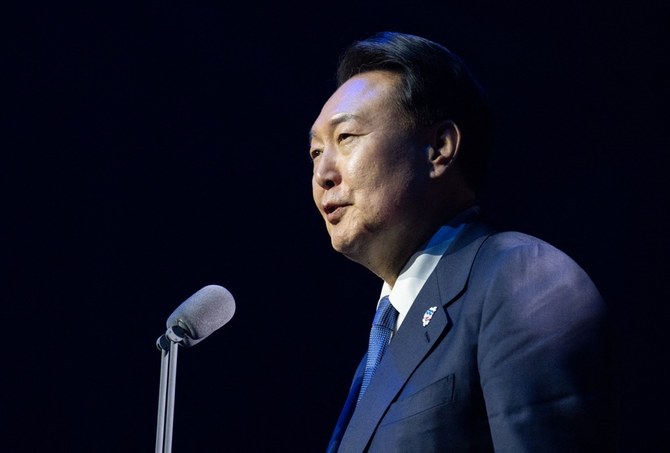
SEOUL: South Korean President Yoon Suk Yeol will meet opposition leader Lee Jae-myung for talks on Monday after a crushing election defeat for the president’s ruling party led to widespread calls for him to change his style of leadership.
Yoon’s People Power Party (PPP) failed to make inroads into the opposition’s grip on parliament in the April 10 election, which was widely seen as a referendum on the conservative leader’s first two years in power.
The meeting is the first Yoon has held with Lee since taking office and comes as analysts have said he may have slipped into lame duck status after his combative political stance appeared to have alienated many voters.
Both the opposition and his own PPP urged Yoon to change course, especially after he initially appeared to shrug off the election result which in turn sent his support ratings in opinion polls plunging to their lowest point of around 20 percent.
At stake was whether he could try to regain the initiative for his pledges to cut taxes, ease business regulations and expand family support in the world’s fastest-aging society while safeguarding fiscal responsibility.
Yoon also faces a tough dilemma in his push for health care reforms. Young doctors walked off the job more than two months ago in protest over the centerpiece plan of increasing the number of doctors, and more are threatening to join the protest.
There are, however, questions over whether Monday’s meeting will be able to make any breakthroughs to unlock the stalemate in government. Lee’s Democratic Party (DP) is firmly in control of parliament, hamstringing Yoon’s ability to pass legislation.
In a sign of the political wrangling to get an upper hand, aides to Yoon and Lee struggled to agree on the time and agenda for their meeting for more than a week before Lee proposed to sit down with no preconditions or set agenda.
Lee has called for a one-time allowance of 250,000 won ($182) for all South Koreans to help cope with inflation, but PPP has called it the kind of populist policy that would make the situation worse and cost 13 trillion won for the government budget.
Blinken speaks to Azeri, Armenian leaders about peace talks
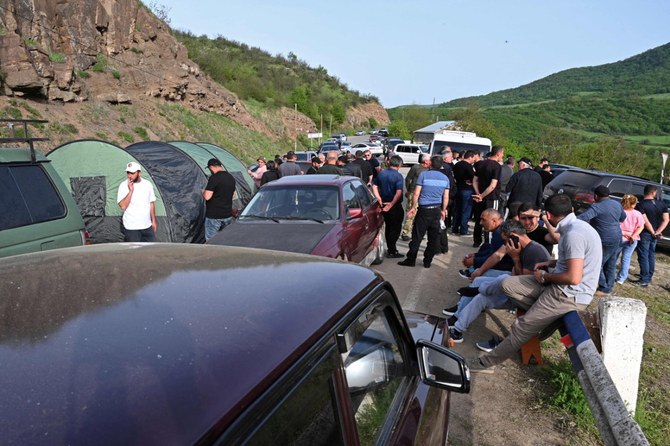
- Blinken reaffirmed Washington’s support for a peace treaty between the South Caucasus neighbors in separate calls with their leaders
- Azeri President Ilham Aliyev's press service later said Azerbaijan's FM will soon meet with his Armenian counterpart to continue negotiations
US Secretary of State Antony Blinken has spoken to the leaders of Armenia and Azerbaijan and reaffirmed Washington’s support for a peace treaty between the South Caucasus neighbors, the State Department said on Sunday.
Yerevan suffered a major defeat last September when Baku’s forces retook the region of Nagorno-Karabakh, which while part of Azerbaijan had a predominantly Armenian population.
Peace talks have become bogged down in issues including demarcation of the two countries’ 1,000-km (620-mile) border, which remains closed and heavily militarized.
Blinken spoke to Azeri President Ilham Aliyev on Sunday and urged him “to keep up the momentum with his Armenian counterpart, reiterating US willingness to support those efforts,” the State Department said in a statement.
Aliyev’s press service said on Sunday that foreign ministers of Azerbaijan and Armenia will soon hold a meeting in Almaty in Kazakhstan to continue negotiations.
“The president considers an important step that ... Azerbaijan and Armenia have begun the process of border demarcation,” Russia’s Interfax news agency cited the press service as saying.
In a separate call with Armenian Prime Minister Nikol Pashinyan, Blinken reaffirmed US support for progress on a durable and dignified peace agreement, the department said, but did not specify when the call took place.
In his call with Aliyev, Blinken also welcomed the transfer to house arrest last week of a prominent Azerbaijani economist and opposition politician who has been imprisoned since last July while awaiting trial.
Azerbaijan has also detained a string of independent reporters since late last year. Several are now facing trial on charges unrelated to journalistic activity, such as smuggling.
“Secretary Blinken again urged Azerbaijan to adhere to its international human rights obligations and commitments and release those unjustly detained in Azerbaijan,” the State Department said.
Donald Trump is running against Joe Biden. But he keeps bringing up another Democrat: Jimmy Carter
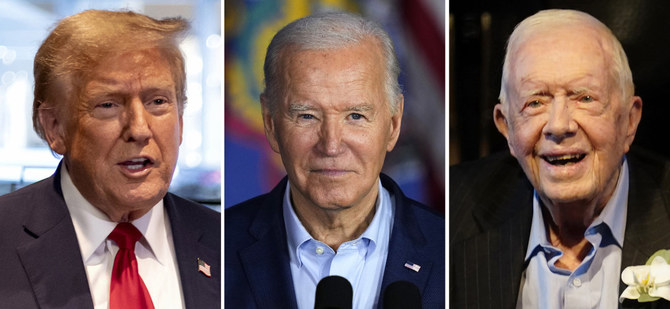
- Carter and Trump actually share common ground. Both were Washington outsiders who won the presidency, each fueled by voter discontent with the establishment
- But unlike Carter, Trump never accepted defeat. He falsely claimed the 2020 election was stolen and is accused of instigating violent efforts to overturn Biden's victory
ATLANTA: As Donald Trump campaigns for a return to the White House, he often reaches back more than 40 years and seven administrations to belittle President Joe Biden by comparing him to 99-year-old Jimmy Carter.
Most recently, Trump used his first campaign stop after the start of his criminal hush money trial in New York to needle the 46th president by saying the 39th president, a recently widowed hospice patient who left office in 1981, was selfishly pleased with Biden’s record.
“Biden is the worst president in the history of our country, worse than Jimmy Carter by a long shot,” Trump said in a variation of a quip he has used throughout the 2024 campaign, including as former first lady Rosalynn Carter was on her deathbed. “Jimmy Carter is happy,” Trump continued about the two Democrats, “because he had a brilliant presidency compared to Biden.”
It was once common for Republicans like Trump to lampoon Carter. Many Democrats, including Presidents Bill Clinton and Barack Obama, kept their distance for years, too, after a roiled economy, energy shortages and an extended American hostage crisis led to Carter’s landslide defeat in 1980. The negative vibes waned, though, with the passage of time and reconsideration of Carter’s legacy as a political leader, Nobel laureate and global humanitarian.
That leaves some observers, Democrats especially, questioning Trump’s attempts to saddle Biden with the decades-old baggage of a frail man who closed his public life last November by silently leading the mourning for his wife of 77 years.
“It’s just a very dated reference,” said pollster Zac McCrary, whose Alabama-based firm has worked for Biden. “It’s akin to a Democrat launching an attack on Gerald Ford or Herbert Hoover or William McKinley. It doesn’t signify anything to voters except Trump taking a cheap shot at a figure that most Americans at this point believe has given a lot to his country and to the world.”
Trump loyalists insist that even a near-centenarian is fair game in the rough-and-tumble reality of presidential politics.
“I was saying it probably before President Trump: Joe Biden’s worse than Jimmy Carter,” said Georgia resident Debbie Dooley, an early national tea party organizer during Obama’s first term and a Trump supporter since early in his 2016 campaign. Dooley said inflation under Biden justifies the parallel: “I’m old enough to remember the gas lines under President Carter.”
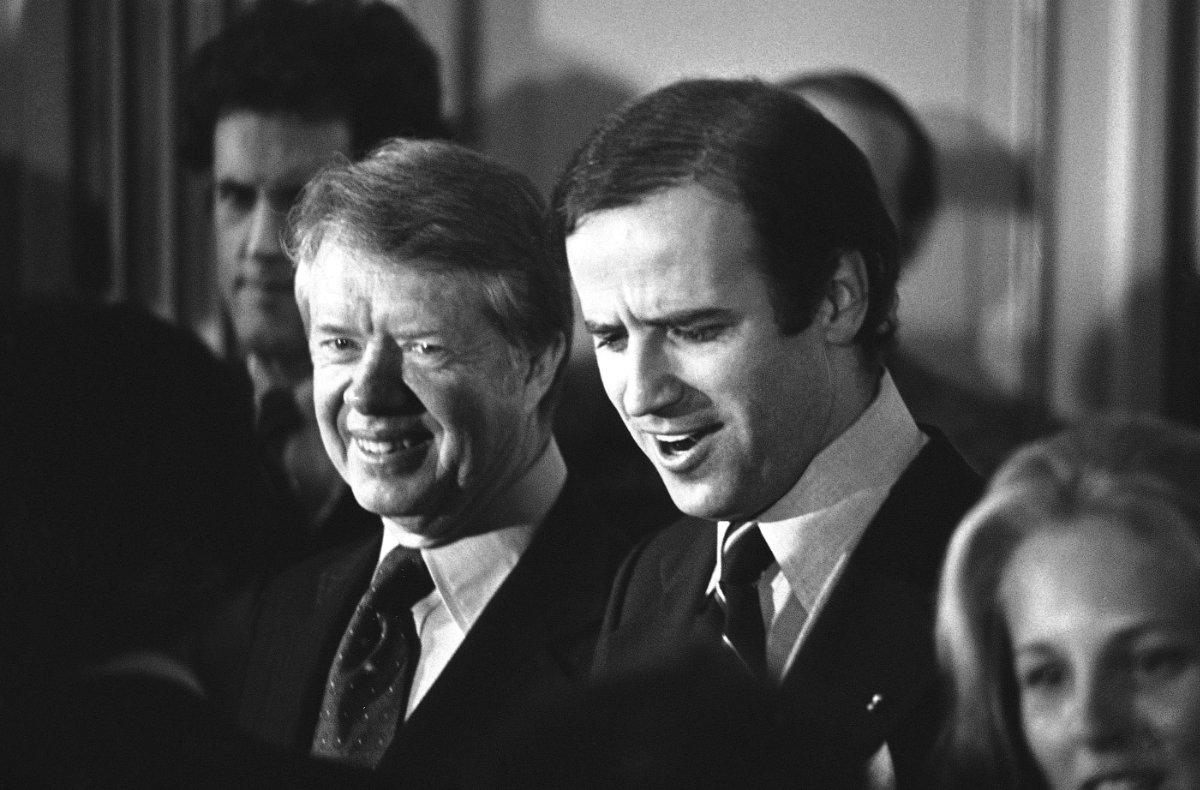
Any comparison, of course, involves selective interpretation, and Trump’s decision to bring a third president into the campaign carries complications for all three –- and perhaps some irony for Trump, who, like Carter, was rejected by voters after one term.
Trump’s campaign did not respond to a request for comment about his comparisons; Biden’s campaign was dismissive of them.
“Donald Trump is flailing and struggling to land coherent attacks on President Biden,” spokesman Seth Schuster said.
Carter remains at home in Plains, Georgia, where those close to him say he has kept up with the campaign. Biden is unquestionably the closest friend Carter has had in the White House since he left it. Biden was a first-term lawmaker from Delaware when he became the first US senator to endorse Carter’s underdog campaign. After he won the White House, Biden and first lady Jill Biden visited the Carters in Plains. They saw a grieving Carter privately before Rosalynn Carter’s funeral in Atlanta last year.
Like Carter, Biden is seeking reelection at a time when Americans are worried about inflation. But today’s economy is not the same as the one Carter faced.
The post-pandemic rebound, fueled by stimulus spending from the US and other governments, has been blamed for global inflation. The Federal Reserve has raised interest rates in response.
But the effective federal funds rate is 5.33 percent right now, while the benchmark was above 17 percent for a key period before the 1980 election. Rates for a 30-year mortgage are about half what they were at the peak of Carter’s administration; unemployment is less than half the Carter peak. The average per-gallon gas price in the US, topping $3.60 this month, is higher than the $3 peak under Trump. It reached $4.50 (adjusted for inflation) during Carter’s last year in office.
Carter and Trump actually share common ground. They are the clearest Washington outsiders in modern history to win the presidency, each fueled by voter discontent with the establishment.
A little-known Georgia governor and peanut farmer, Carter leveraged fallout from Vietnam and the Watergate scandal. Trump was the populist businessman and reality TV star who pledged to “Make America Great Again.” Both men defy ideological labels, standing out for their willingness to talk to dictators and isolated nations such as North Korea, even if they offered differing explanations for why.
Carter cautioned his party about underestimating Trump’s appeal, and the Carters attended Trump’s 2017 inauguration. Jimmy Carter, however, openly criticized Trump’s penchant for lies. After Carter suggested Russian propaganda helped elect Trump over Democrat Hillary Clinton in 2016, Trump began to insult Carter as a failure.
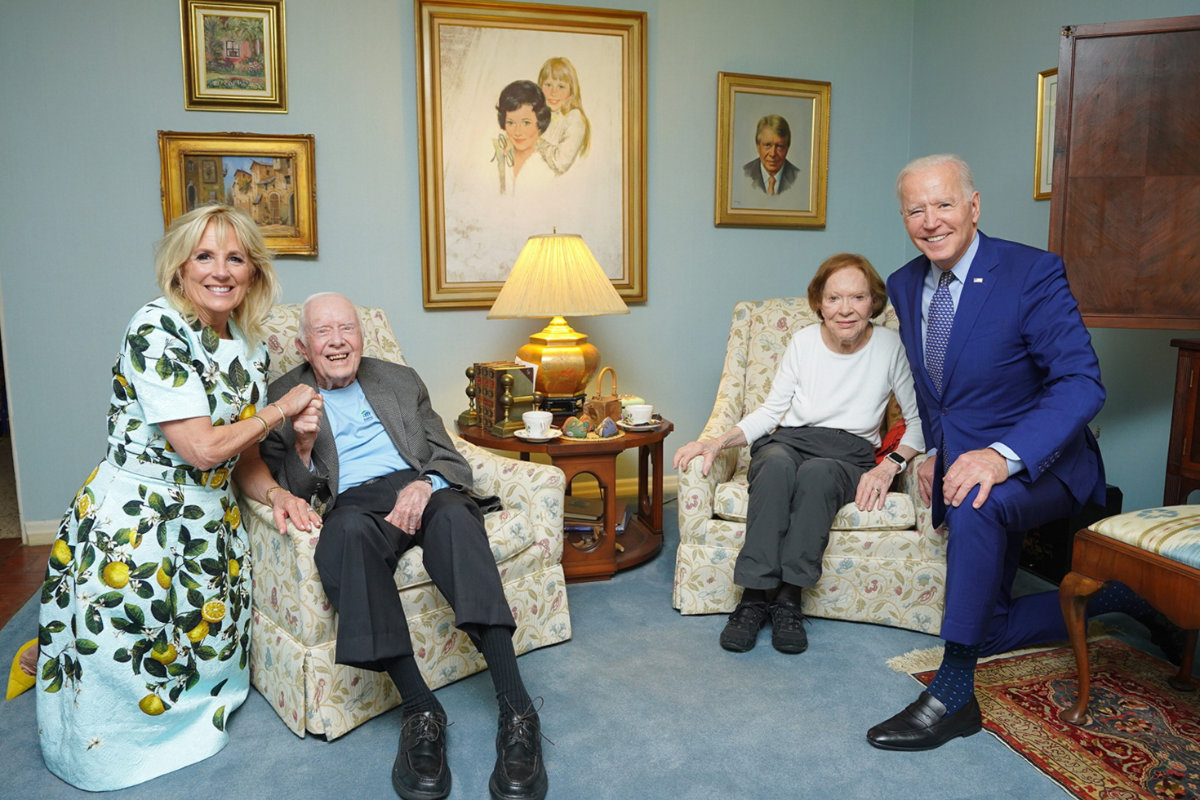
Unlike Carter, Trump never accepted defeat. He falsely claimed the 2020 election was stolen, then promoted debunked theories about the election that were repeated by supporters in the mob that stormed the US Capitol on Jan. 6, 2021, as Congress convened to certify Biden’s victory. Trump left Washington the morning Biden took office, becoming the first president since Andrew Johnson in 1869 to skip his successor’s inauguration.
Carter conceded to Republican Ronald Reagan, attended his inauguration, then returned to Georgia. There, he and Rosalynn Carter established The Carter Center in 1982. They spent decades advocating for democracy, mediating international conflict and advancing public health in the developing world. They built houses for low-income people with Habitat for Humanity. Jimmy Carter was awarded the Nobel Peace Prize in 2002.
Many historians’ judgment of Carter’s presidency has softened.
He is credited with deregulating much of the transportation industry, making air travel far more accessible to Americans, and creating the Department of Energy to streamline and coordinate the nation’s energy research. He negotiated the Camp David peace deal between Egypt and Israel. He diversified the federal judiciary and executive branch. He appointed the Federal Reserve chairman, Paul Volcker, who, along with Reagan, would get credit for the economic growth of the 1980s. Carter was the first president to raise concerns about rising global temperatures. And it was Carter, along with his diplomatic team, who negotiated the release of American hostages in Tehran, though they were not freed until minutes after Carter’s term expired.
Biographies, documentaries and news coverage across Carter’s 10th decade have reassessed that record.
By 2015, a Quinnipiac University poll found 40 percent of registered voters viewed Carter as having done the best work since leaving office among presidents from Carter through George W. Bush. When Gallup asked voters last year to rate Carter’s handling of his presidency, 57 percent approved and 36 percent disapproved. (Trump measured 46 percent approval and 54 percent disapproval at the time, the first retroactive measure Gallup had conducted for him.)
“There has long been a general consensus of admiration for Carter as a person — that sentiment that he was a good and decent man,” said Amber Roessner, a University of Tennessee professor who studies collective public memory and has written extensively on Carter. The more recent conclusions about Carter as a president, she added, suggest “we should consider Carter’s presidency as a lens to think about reevaluating about how we gauge the failure or success of any administration.”
How that plays into Biden’s rematch with Trump, Roessner said, “remains to be seen.”
Regardless, the ties between the 39th and 46th presidents endure, whatever the 45th president might say. When the time comes for Carter’s state funeral, Trump is expected to be invited alongside Carter’s other living successors. But it will be Biden who delivers the eulogy.
Pro-Palestinian protests keep roiling US college campuses
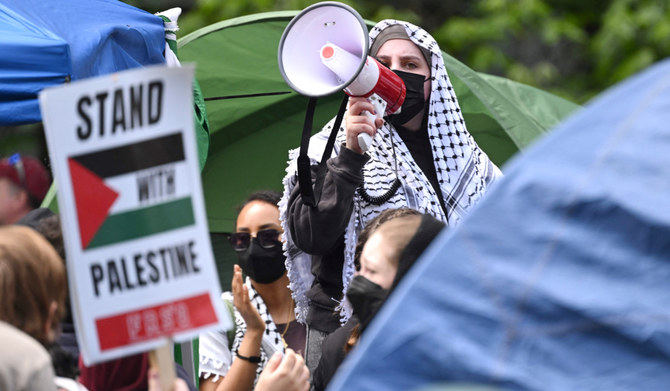
- Israel has killed more than 34,000 Palestinians, according to Gaza’s Health Ministry
- “They were expecting about 65,000 people on campus, and they just did not feel that it was going to be safe,” Bass said on CNN’s “State of the Union”
WASHINGTON: Pro-Palestinian protests at US universities showed no sign of slowing as they spread coast-to-coast over the weekend and police crackdowns and arrests continued into another week while students vowed to stay in tent encampments until their demands are met.
The students’ demands range from a ceasefire in Israel’s war with Hamas to calls for universities to stop investing in Israeli enterprises involved with the country’s military to an end for US military assistance for Israel.
Pro-Palestinian protests have spread to college campuses across the US, stoked by the mass arrest of over 100 people on Columbia University’s campus more than a week ago.
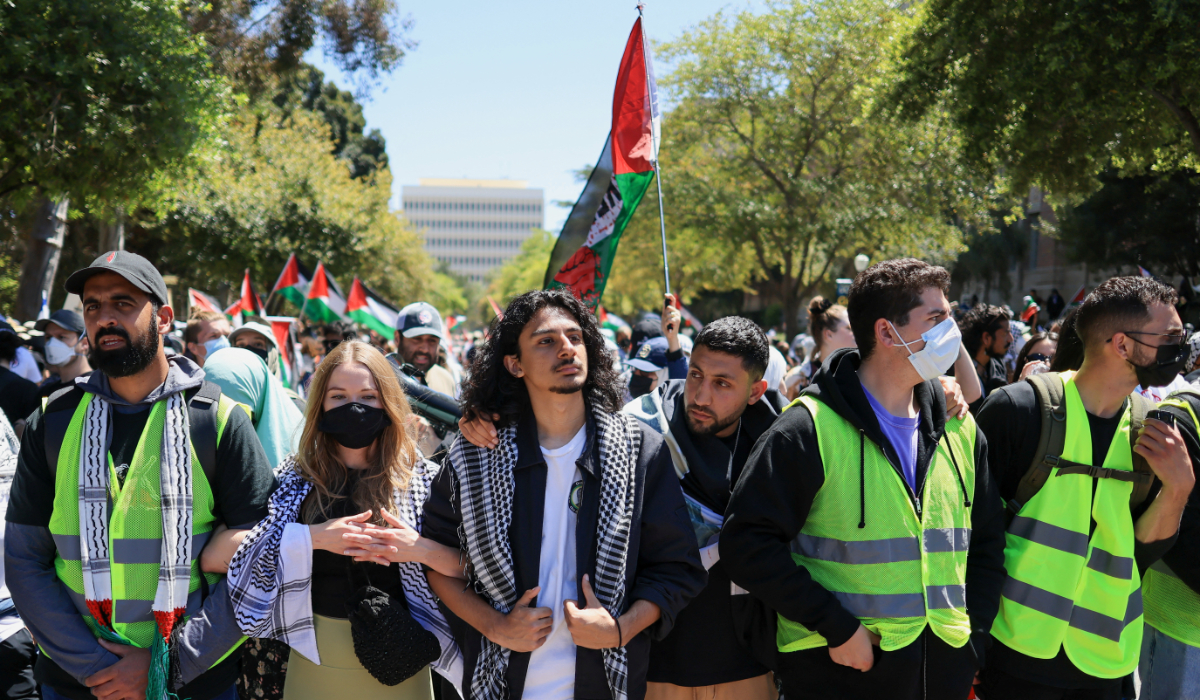
The Columbia campus was peaceful on Saturday and there were no reports of arrests of disturbances overnight, a school spokesman told Reuters.
But crackdowns continued at a handful of campuses on Saturday including a lockdown at the University of Southern California (USC) and a heavy police presence. More than 200 people were arrested at a handful of schools including 80 late on Saturday at Washington University in St. Louis. Among those arrested at Washington University was 2024 Green Party presidential candidate Jill Stein.
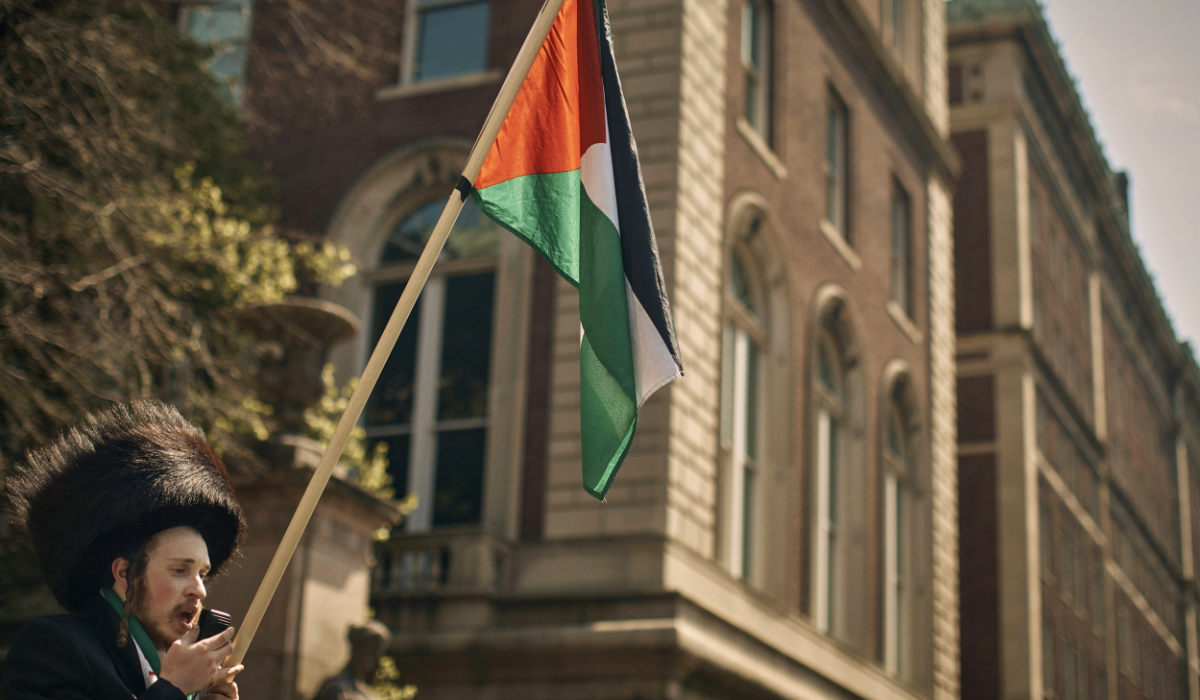
“They are sending in the riot police and basically creating a riot in an otherwise peaceful demonstration. So this is just shameful,” Stein said in a statement.
Washington University said in a statement that those arrested would be charged with trespassing.
On Sunday, dueling demonstrations were set to begin at the University of Southern California, Los Angeles. Outside groups were planning to demonstrate in favor of and against the pro-Palestinian encampments.
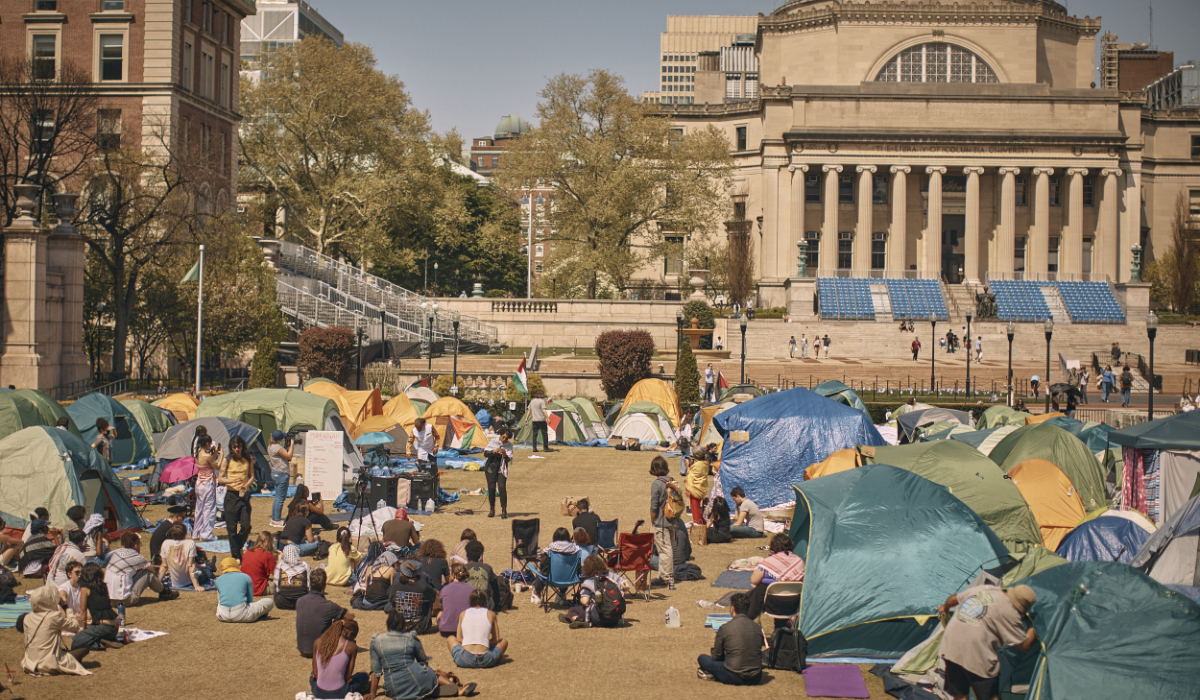
Members of the Harriet Tubman Center for Social Justice planned to support students’ right to protest.
In opposition, however, a group called Stand With Us will hold a “Stand in Support of Jewish Students” rally to “stand up against hatred and antisemitism.”
The nationwide protests have caught the attention of President Joe Biden.
White House national security spokesman John Kirby told ABC News on Sunday that the president knows there are very strong feelings about the war in Gaza.
“He understands that, he respects that and as he has said many times, we certainly respect the right of peaceful protest,” Kirby said. “People should have the ability to air their views and to share their perspectives publicly, but it has to be peaceful.”
Kirby added that the president condemns antisemitism and condemns hate speech.
At USC, leadership has canceled the main commencement ceremony after it called off the valedictorian speech by a Muslim student who said she was silenced by anti-Palestinian hatred.
Los Angeles Mayor Karen Bass said on Sunday she believed that canceling the commencement was a decision “they had to make.”
“They were expecting about 65,000 people on campus, and they just did not feel that it was going to be safe,” Bass said on CNN’s “State of the Union.”


